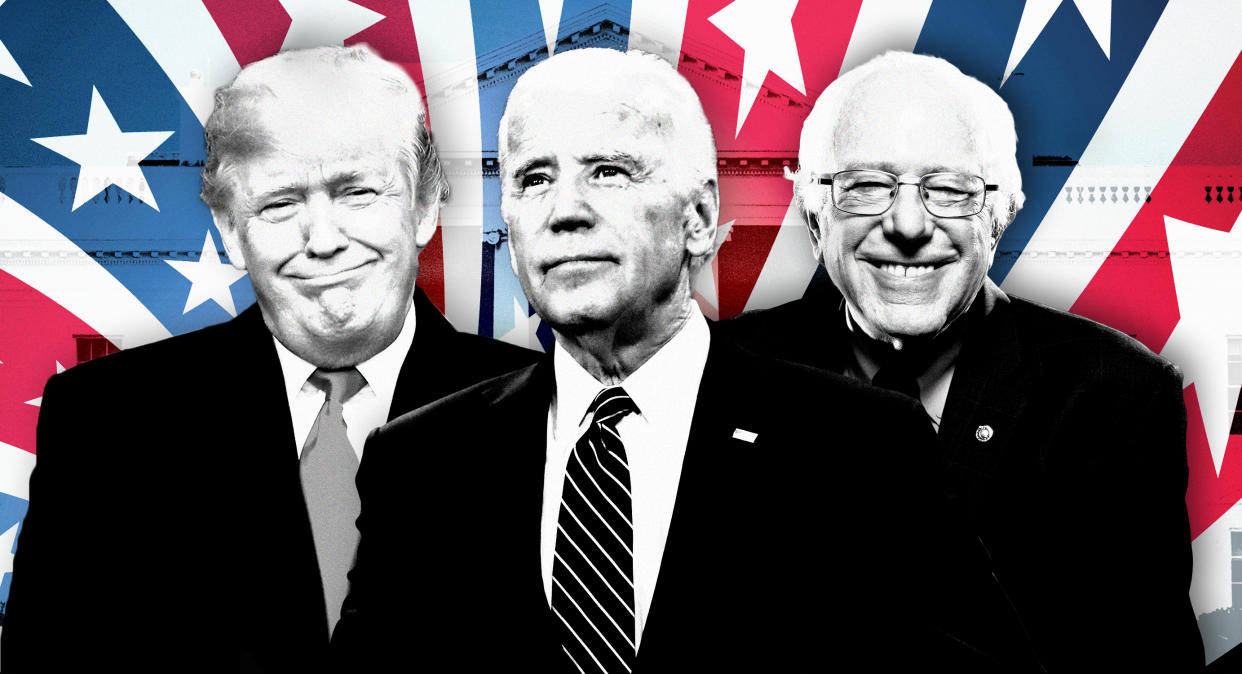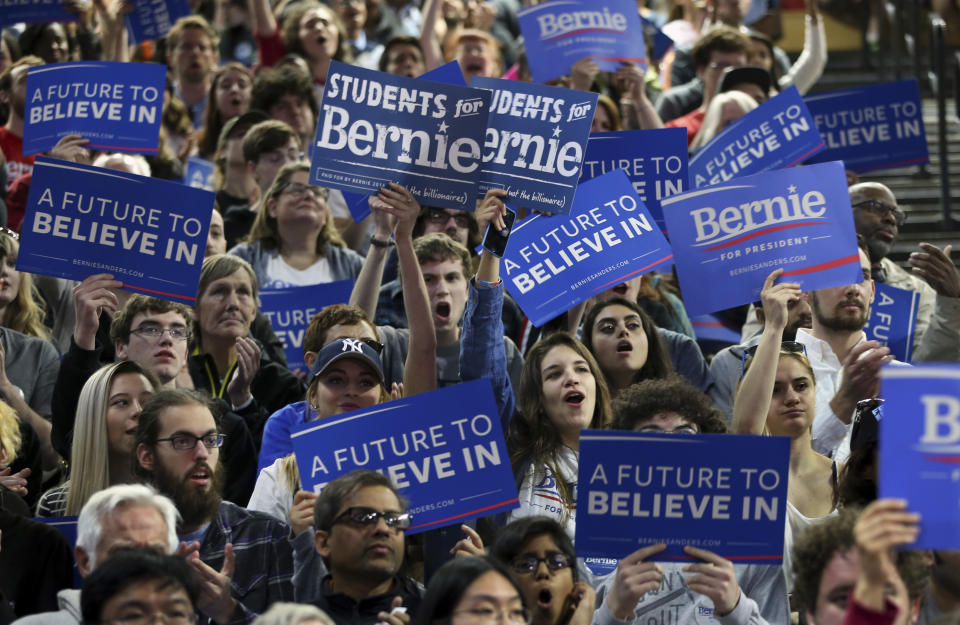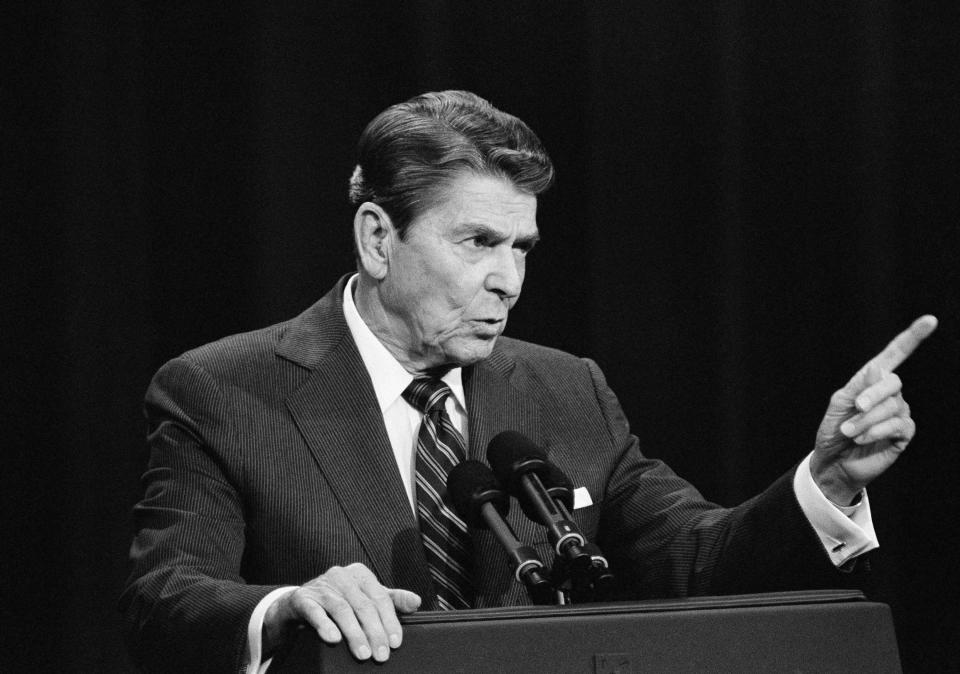Too old for 2020? Trump, Biden, Bernie and the politics of age

While the field of candidates for the next presidential election is still taking shape, it is likely to include the oldest person ever to seek the office.
President Trump, already the oldest first-term president in U.S. history, has begun campaigning for re-election and will be 74 by election day 2020. Though undecided about a run, former Vice President Joe Biden, who tops most early Democratic polls, will be just shy of 78, and Vermont Sen. Bernie Sanders will be 79.
They may be old, but they want voters to know they’re still in fighting trim. “If I were in high school, I’d take him behind the gym and beat the hell out of him,” Biden said of Trump, in answer to a question about the president’s crude comments about women.
That prompted Trump to assure the nation that he would get the better of the hypothetical fist fight.
Crazy Joe Biden is trying to act like a tough guy. Actually, he is weak, both mentally and physically, and yet he threatens me, for the second time, with physical assault. He doesn’t know me, but he would go down fast and hard, crying all the way. Don’t threaten people Joe!
— Donald J. Trump (@realDonaldTrump) March 22, 2018
But will young voters, mobilized by the movement that has sprung up in response to the high school shooting in Parkland, Fla., turn out for candidates well into their 70s?
“I personally intend to support somebody who is young,” Howard Dean, the former Vermont governor and presidential candidate told Yahoo News. “My preference is someone under 50. I think it’s time we turned the page on my generation’s culture wars.”
Dean, who is 69 now but was 55 when he ran for president, believes Democrats should aim to motivate young voters by nominating a candidate with less gray hair and more youthful energy.
“I think the best way to activate them is to get somebody who they can relate to, and that’s someone who is young, the younger the better,” Dean said.
Commentators worry that Democrats might squander their opportunity to draw a contrast with an aging Republican president.
“Democrats could choose a challenger so old that the prospect of infirmity or mortality — or worse yet, actual infirmity or mortality during the general-election campaign — could give Trump just the kind of advantage he needs,” columnist Ed Kilgore wrote for New York magazine’s “Daily Intelligencer.”
For others, however, that kind of calculus smacks of discrimination.

“Ageism is the last ‘ism’ that seems to be acceptable to people, and I never felt that it was whether somebody was too young or too old,” Jane Sanders, the Vermont senator’s wife told the New York Times.
The focus on Sanders’s age overlooks the extent to which he resonated with young voters in the 2016 campaign, routinely trouncing Hillary Clinton in primaries among millennial voters, according exit polls. While that enthusiasm is not lost on Dean, he also sees its limits.
“The difference was that he got [young voters] because he was outspoken and was speaking truth to power, and that’s sort of the reason I got them,” Dean said. “But I think I would like somebody who has a more rounded approach to issues. The way that young people think is not the way that people my age think, and that’s really the crux of all of this.”
But just fielding a younger candidate may not be a surefire way to energize voters, argues Princeton University professor of history and public affairs Julian Zelizer.
“I think there’s still probably a bias in the electorate that younger is new, younger is fresh, younger is different, but middle age still seems to be a pretty good place if you’re running politically,” Zelizer told Yahoo News. “In the 2016 Democratic primary, the agent of change was Bernie Sanders, and in the end Democrats rallied around Hillary Clinton, who was also older. People like young and they see young as different, but when it comes time to vote, I don’t think age plays as solid a role as you’d think.”
Is age itself a reason for concern?
Apart from the political message it sends, nominating a candidate pushing 80 presents at least one clear area of medical concern — the increased risk of dementia.
At age 65, one in 10 Americans suffers from Alzheimer’s disease or other forms of dementia, according to statistics from the National Institute on Aging. That number jumps significantly over the next 10 years of age: 17 percent of people age 75 to 84 are diagnosed with Alzheimer’s, and 38 percent of people age 85 or older suffer from the disease.

“I would not want to have a president who is demented. I think that’s dangerous,” Dr. Laura Carstensen, director of Stanford University’s Center on Longevity, told Yahoo News. “But older people are also more likely to solve emotionally charged conflicts better than young people. Of course, that’s not the case with everyone. A cardinal feature of research on aging is that the older the population that you’re studying, the more variability you see. For people over 85, for instance, we would include very wise Supreme Court justices and then you have the most demented, in the same age group. I think what this means is that we have to be thinking about individuals more than age groups.”
While advanced age also correlates with a higher instance of cancer and heart disease, dementia poses a different level of worry. For this reason, Carstensen thinks presidential candidates should undergo cognitive testing, but not just to identify the onset of dementia.
“I think the idea of having people not only report their physical health records, but also their cognitive health is a good idea,” Carstensen said. “I wouldn’t like to see us move in a direction where we’re only targeting old people and only targeting one thing that could be a problem because there are a lot of other things we should be looking at.”
Moreover, Carstensen sees the need to evaluate the mental and physical health of all presidential candidates, young or old. At his first physical as president in January, Trump requested a cognitive assessment, which, his physician reported, he passed.
“I wouldn’t want to give all people under the age of 60 a pass for being mentally fit, while targeting old people.”
Making an issue out of age
In one of the more famous lines delivered in a presidential debate, Ronald Reagan, who was 73 when he faced off in his 1984 reelection campaign against 56-year-old Walter Mondale, deftly parried Baltimore Sun reporter Henry Trewhitt’s question on whether his advanced age would inhibit his ability to handle an emergency like the Cuban missile crisis.
“Not at all, Mr. Trewhitt, and I want you to know that also I will not make age an issue of this campaign,” Reagan responded. “I am not going to exploit for political purposes my opponent’s youth and inexperience.”

Despite being issued a clean bill of health by his physicians, doubts about Reagan’s mental acuity persisted throughout his second term. In 1994, five years after he left office at the age of 77, he announced that he had been diagnosed with Alzheimer’s disease.
A subsequent study by Arizona State University researchers published in the Journal of Alzheimer’s Disease based on Reagan’s speech patterns found that the onset of dementia was apparent while he was in the White House. Looking at the 46 news conferences that Reagan held while in office and comparing them against 101 held by George H.W. Bush, the researchers noted a marked increase in repetitive words and nonspecific terms as Reagan’s presidency went on. For Bush, who has never been diagnosed with Alzheimer’s, no such deterioration was noted.
“Most of the neurologists I know suspected that something was going on with Reagan when he was still in office. Whether the job was speeding up the progression is quite another question and I don’t think we have any evidence for that.” Carstensen said.
In 2017, the health website STAT conducted a similar analysis of decades worth of Trump on-air interviews in the ’80s and ’90s, and compared them with those conducted since his inauguration. Seeking the opinion of “experts in neurolinguistics and cognitive assessment,” the panel came to the unanimous conclusion that the president had undergone mental deterioration. Yet their findings are hardly conclusive.

“The experts noted clear changes from Trump’s unscripted answers 30 years ago to those in 2017, in some cases stark enough to raise questions about his brain health,” Sharon Begley wrote in STAT. “They noted, however, that the same sort of linguistic decline can also reflect stress, frustration, anger, or just plain fatigue.”
‘The oldest guy ever to be president’
The battle lines of the coming campaign are already being drawn on the subject of age.
“Joe Biden has been living off the swamp for five decades now, and if that is the person that the Democrats wants to run, that they think the American people wants [sic] then I wish them a lot of luck with that,” Lara Trump said of the former vice president on Fox News.
While Biden himself acknowledges that his age could be seen as a liability, he believes running against Trump would minimize those concerns.
“Look, it would be a totally legitimate thing for people to say ‘Let’s look at Biden. He would be the oldest guy to ever be president. See what kind of shape he’s in, mentally, physically and the rest,” Biden told PBS in a January interview, adding. “It’s probably the least consequential of any election because of who you’d be running against, in all probability.”
Zelizer agrees with that assessment, noting that the Democratic fervor to remove Trump from office outweighs age considerations.
“Ordinarily, youth and change go hand in hand, but I think this time it might not work that way because of how Trump is defining the landscape,” Zelizer says.
Still, Dean believes it’s better to field a candidate who presents a clear contrast with Trump, and that starts with age.
“I think we need someone who’s sober-minded and young, who knows what they’re talking about, and that’s the great contrast with Trump, who is sort of this blustering guy who knows nothing and is obnoxious, frankly, to most kids.”
While Zelizer doesn’t think being young is a prerequisite for running for president in 2020, he acknowledges that the post-Parkland youth movement could help reshape the political landscape, making age a bigger factor than in past election cycles.
“If young people can turn this moment of protest into something bigger, mobilizing voters in their 20s, for instance, you could see a shift in issues,” Zelier said. “Certainly with gun control, that’s front and center. I don’t think it’s a matter of bringing new voices into the arena. I think it’s more important that they shift the agenda and force candidates of all ages to deal with these questions.”


